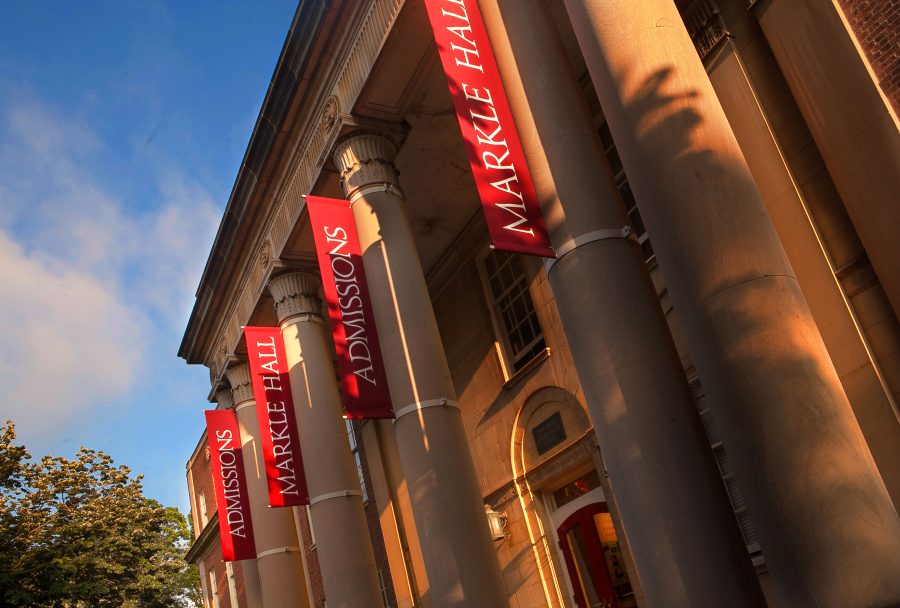After a Reuters report put Lafayette admissions in the spotlight for accepting perks in exchange for admissions help, admissions officers have denied both giving a special advantage to students and breaching the college’s code of ethics.
Both Dean of Admissions Matt Hyde and Associate Director Eugene Gabay accepted benefits in exchange for leading two workshops about U.S. application systems for Shanghai-based company DiPont.
They said no ethics were breached and everything was “above board.”
DiPont, the for-profit company that hosted the workshops, has also been accused by former employees of writing application essays. In addition to other educational services, students may pay DiPont up to $32,500 just for college counseling, according to Reuters. DiPont did not respond to The Lafayette’s request for comment.
Upon asking Hyde and Gabay to lead classes at the workshops, DiPont offered them one of two perks: a $4,500 honorarium or a free business-class plane ticket to the eight-day event in Shanghai.
Hyde, who taught at the workshop in 2015, confirmed he accepted and kept the honorarium. Gabay took the free airfare. The workshop, they said, was not a Lafayette recruiting event. Reuters reported that a DiPont company consultant said 21 other colleges also attended the workshops over three summers.
Lafayette’s ethics code for finance and administration, which applies to admissions staff, stipulates that no gifts in the form of items valued above $100 should be accepted by employees. Additionally, “other potential business items such as free airfare … should not be accepted.”
It continues, “Cash gifts or similar gift cards in any amount or value should not be accepted, even if their stated value, when combined with other gifts from the vendor, would be below the $100 limit per fiscal year.”
Both Hyde and Gabay are confident that the definition of “gifts” does not apply in this case. Instead, they believe the “spirit” of the ethics code was not breached.
Vice President for Finance and Administration Roger Demareski noted that the ethics policy is more “common sense” than “rocket science.”
“Most people know when something is appropriate or when it’s not,” Demareski said. “It’s those that make a poor decision or have a question and don’t check.”
“I think the better practice in each case is to think, ‘Is there a quid pro quo to what I’m being asked to do?’ Or, ‘I’ll give you this free thing and you do this for me,’” he added.
President Alison Byerly said that no ethical guidelines were breached by accepting the money and airfare.
“An honorarium is a payment for something you’ve actually done,” said Byerly, when shown the ethics policy. “A gift raises the question of conflict of interest, because if someone gives you a gift for no reason, then it’s implied that they’re buying some kind of influence.”
She declined to comment further on whether accepting free airfare violated the code.
Gabay said he would not have taken part in the workshop had he not been offered the honorarium or free airfare. He added that he does not do business with for-profit actors. Hyde said that in hindsight he would have gone without the offer, but he knew that the trip was covered beforehand.
“If an honoraria is offered, it tends to be commensurate with the effort that is required to take part,” Hyde wrote in an email. “Given the demands of the commitment and the weeks of my summer invested in the experience, I felt fine accepting the honorarium.”
Gabay similarly said that the free airfare was appropriate for his eight-to-10-hour work days. They did not believe DiPont intended the offer to be a gift.
Reuters reported that admissions officers at other schools donated the honoraria to their school’s financial aid budget and one declined the honorarium altogether, citing concerns about ethics.
In both Lafayette officers’ experiences, no other educational organizations offered the benefits that DiPont had. Hyde said that in other cases, a school may present a Starbucks gift card or something similar after an admissions counselor gives a presentation. In those cases, the officer was not made aware that they would be receiving the small gift.
In the workshops, admissions officers from several U.S. colleges led discussions on the college application system and worked closely with students on essay-writing. Reuters reported that a DiPont advertisement for the program read, “Just once a year, current admissions officers become your exclusive consultants.”
Both admissions officers said the workshop neither gave students an advantage in Lafayette’s admissions process nor in the general U.S. college admissions process.
“The advantage is getting educated from those who are in the admissions world, but beyond that, there was no inherent advantage,” Gabay said. “So if a student applied, whether they went through this program or not, there is no difference, I would believe, in terms of their acceptance rates.”
Gabay added that if they weren’t at the workshop, there would not have been structures in place – other than the internet and older students – to teach students about the admissions process.
Lafayette admissions also visits high schools around China on recruiting events where they promote Lafayette and answer questions about the application system. DiPont typically organizes those visits but offers no honoraria.
Hyde and Gabay said they viewed their eight days in the workshop as a time for professional development. They said they learned about how a colossal market for students was approaching their next leg of education.
Lafayette received 482 applications from China last year, roughly 100 fewer than the previous year. Lafayette admissions said they do not record whether an applicant participated in a DiPont program. To understand the number of DiPont students at Lafayette, they said they would have to dig into each file. The college did not say whether it would look into that.
Lafayette admissions said they have yet to determine whether they’ll keep a relationship with DiPont.

























































































































